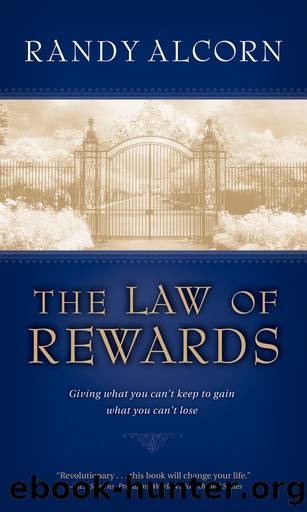The Law of Rewards by Randy Alcorn

Author:Randy Alcorn [Alcorn, Randy]
Language: eng
Format: epub
Tags: BUSINESS & ECONOMICS / Personal Finance / General, RELIGION / Christianity / Stewardship
Publisher: Tyndale House Publishers, Inc.
Published: 2013-07-01T00:00:00+00:00
WHAT GOOD ARE WORKS?
For those who have served Christ faithfully, the judgment seat will be a time of commendation and celebration. He will reward us for acts of love that no one else even noticed.
The five-hundred-year-old play Everyman is a picture of all people. As Everyman faces Death, he looks among his friends for a companion. Only one friend would accompany him on the journey through death to final judgment. His name? âGood Deeds.â
Some balk at such a picture. Yet itâs explicitly biblical: âThen I heard a voice from heaven say, âWrite: Blessed are the dead who die in the Lord from now on.â âYes,â says the Spirit, âthey will rest from their labor, for their deeds will follow themââ (Revelation 14:13).
In Revelation 19:7-8, weâre told ââThe wedding of the Lamb has come, and his bride has made herself ready. Fine linen, bright and clean, was given her to wear.â (Fine linen stands for the righteous acts of the saints.)â
Note that the parenthetical statement in the preceding verse is not mine but Godâs. I once cited this verse in another book and the editor promptly âcorrectedâ it, assuming it was my own interpretation. Why? Because it didnât sound right. But it isâitâs Scripture!
We might expect to be told that Christ makes the bride ready, rather than she herself. We might expect that the fine linen would stand for âthe righteousness of Christ,â or perhaps âthe righteous faith of the saints.â But what we are told is that it stands for âthe righteous acts of the saints.â
Weâve been deceived into thinking that works is a dirty word. God condemns works done to earn salvation and works done to impress others. But our Lord enthusiastically commends works done for the right reasons. Immediately after saying our salvation is ânot by works,â Paul adds: âFor we are Godâs workmanship, created in Christ Jesus to do good works, which God prepared in advance for us to doâ (Ephesians 2:10). The fact that we frequently quote the previous verses and not verse 10 demonstrates our imbalance.
God has a lifetime of good works for each of us to do, including many works with our money and possessions. He will reward us according to whether or not we do them.
Scripture ties Godâs reward-giving to his character: âGod is not unjust; he will not forget your work and the love you have shown him as you have helped his people and continue to help themâ (Hebrews 6:10). The verses that follow in Hebrews 6 tell us that if we are to inherit Godâs promised blessings, we must not become lazy but be diligent in our God-given works.
James repeatedly states that good works are essential to the Christian life (James 2:17-18, 22, 24, 26). âWho is wise and understanding among you? Let him show it by his good life, by deeds done in the humility that comes from wisdomâ (James 3:13).
Download
This site does not store any files on its server. We only index and link to content provided by other sites. Please contact the content providers to delete copyright contents if any and email us, we'll remove relevant links or contents immediately.
The 5 Love Languages: The Secret to Love That Lasts by Gary Chapman(9792)
The Space Between by Michelle L. Teichman(6932)
Assassin’s Fate by Robin Hobb(6200)
Wiseguy by Nicholas Pileggi(5771)
Everything Happens for a Reason by Kate Bowler(4734)
Gerald's Game by Stephen King(4642)
Pillow Thoughts by Courtney Peppernell(4272)
A Simplified Life by Emily Ley(4158)
The Power of Positive Thinking by Norman Vincent Peale(4062)
Harry Potter and the Prisoner of Azkaban (Book 3) by J. K. Rowling(3355)
Resisting Happiness by Matthew Kelly(3337)
Girl, Wash Your Face by Rachel Hollis(3282)
Being Aware of Being Aware by Rupert Spira(3272)
The Secret Power of Speaking God's Word by Joyce Meyer(3184)
The Code Book by Simon Singh(3181)
More Language of Letting Go: 366 New Daily Meditations by Melody Beattie(3024)
Real Sex by Lauren F. Winner(3016)
Name Book, The: Over 10,000 Names--Their Meanings, Origins, and Spiritual Significance by Astoria Dorothy(2982)
The Holy Spirit by Billy Graham(2944)
